Caregivers Guide To
Alzheimer's - & - Dementia
Movies

The Power of Representation in Film and TV industry
Many of us watch films to escape from the stress of our day-to-day lives, but others indulge in movies and TV shows to see themselves and not feel so alone in what they face.
Although representation hasn’t always been at the forefront of the entertainment industry, it certainly has come a long way, with the last twenty years being responsible for some of the most progressive creations yet.
Overlooked in Film: Portraying the Reality of Caregiving
Representing different jobs, conditions, and people of all backgrounds isn’t only necessary to raise awareness of topics but also helps those dealing with these struggles to find comfort.
One profession often underrepresented is being a carer, and it is hard to find films that accurately portray this job and patients who have dementia.


There have been multiple times that dementia has been portrayed in a harmful way through cinema, specifically with the horror genre using the condition for comedic effect or to invoke feelings of fear in viewers.
While films that do this may be entertaining, they aren’t helpful for carers or patients and can have distressing implications that spread stereotypes and negative opinions.

06 million+
Americans have Alzheimer’s
When we consider that more than 6 million Americans have Alzheimer’s, it is clear that this condition should be more widely represented in film.
We consume movies and TV shows in our everyday lives, with entertainment being one of the most poignant ways of influencing the masses.

On the other hand, aside from influencing the public to have better and more understanding views surrounding dementia, films with Alzheimer’s representation could make a considerable difference to caregivers who feel alone or are seeking something to relate to.
Not only does this include those in the caring profession, but also those caring for a loved one, with this being an incredibly emotional and stressful experience that can feel isolating.
Additionally, showing certain films to the person in your life who has dementia is a great idea and can distract them from the confusion and anxiety they face daily.
While it may take some adjusting to, adding movies to their weekly routine can be an excellent way to break up their week and implement some fun.
From valuable lessons to heartwarming stories that leave you emotional, there are plenty of films out there that include a dementia storyline. In this guide, we will detail the various movies that have dementia depictions, giving a strong emphasis on how caregiving can be rewarding, raw, and impactful. We will also consider the best films to watch with dementia patients and why watching films could be the positive change they need.

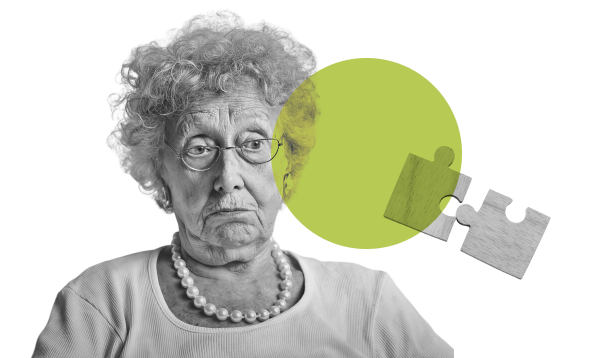
Background on Dementia

Before we delve into the top films based on dementia, it is vital that we cover the background of the condition and how it affects people’s lives.
If you’re a carer, we recognize that you will likely know the information we are about to cover. Still, either way, it is helpful to refamiliarize yourself with some background knowledge on the condition before watching films that cover it. This ensures you have facts to base your opinions on, not fictional stories.
The first point that those new to learning about this condition should know is that dementia doesn’t refer to a specific disease but instead acts as a general term for struggles with memory, thinking, and making decisions that affect somebody’s daily life.
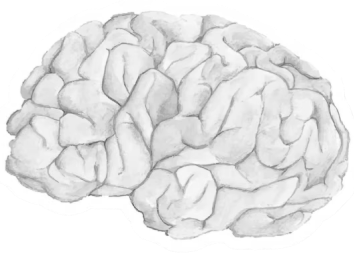
The symptoms of dementia vary from person to person since it is such a broad term. However, there are common crossovers that most people encounter when showing signs of dementia. These symptoms include:
Experience memory loss
Struggles communicating
Problems with judgment
Forgetting loved ones’ names
Getting lost in familiar places
The most substantial risk factor for dementia is age. However, other elements can cause the condition. These factors include family history, poor heart health, and traumatic head injuries.
A common misconception of dementia is that all those with the condition have the same type of dementia when, in reality, there are multiple types of dementia that you can be diagnosed with.
Let’s take a look into dementia’s various types
Alzheimer's Disease

Alzheimer’s is the most common cause of dementia and accounts for over 60% of all dementia cases.
60%
of dementia caused by Alzheimer
The first sign that someone is developing Alzheimer’s is that their short-term memories will become warped and harder to recognize, with long-term memory impacts coming later in the condition.
Your risk factor for Alzheimer’s increases if you have family members that have suffered from the disease, with a first-degree relative making your chances of developing the disease significantly higher. Personality changes and physical health struggles, such as walking, can also occur later on with the condition.
This type of dementia affects more than just memory and can leave those suffering from the condition unsteady on their feet due to balance problems, stiffness, and trembling.
Vivid hallucinations also accompany this type of dementia, leading to a further confused state and a disturbed sleeping pattern.
Symptoms
- Vivid hallucinations
- Disturbed sleeping pattern
- Balance problems
- Trembling
Lewy Body Dementia

Fronto-Temporal Dementia

This type of dementia can massively impact someone’s personality, causing the individual to behave in a way that is out of character for them.
For example, maybe somebody has been shy and careful with their words for their whole life; with frontotemporal dementia, the individual may start making offensive comments and being disruptive, indicating a clear shift in personality.
Issues with blood flow to the brain and strokes account for around 10 percent of dementia causes, making vascular dementia one of the most common types on our list. Unlike other types of dementia,
This type worsens as the physical state deteriorates. So, if a patient has more strokes, their dementia symptoms that may have once been mild will worsen.
10%
of people with dementia have vascular dementia
Vascular Dementia

Mixed Dementia

It can be common for people with dementia to have multiple different types of the condition simultaneously, although this is difficult to determine as symptoms will crossover.
One of the main indications of mixed dementia is quick deterioration, with the disease worsening much faster than an individual dementia type.
Dementia can be triggered by medical conditions or medications with vitamin deficiency and increased pressure in the brain triggering dementia symptoms.
For anyone with this type of dementia, their doctor or medical professional should look into reversible causes and act accordingly.
Reversible Causes


Can Dementia Be Cured?
Unfortunately, hereditary dementia, such as Alzheimer’s, has no cure, but…
medications are available that help the brain manage symptoms that come with the condition, such as anxiety.
As with many health conditions, maintaining good health is the best way to minimize your chances of developing symptoms.
You can’t change your family history, age, or genetics, but you can always look after yourself to maximize good health.

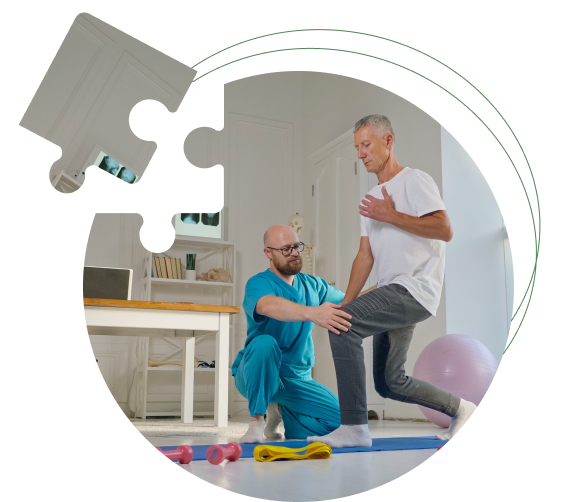
Focussing on being active and staying engaged as you age are great ways to ensure your brain and body are healthy while keeping up a routine.
Physical activity can help you to have a better sleeping pattern and reduce your chances of developing mental health issues that come hand in hand with dementia.

Films for Caregivers and Those Aiming To Expand Dementia Knowledge to Watch
If you are a caregiver, you may be looking for something you can relate to or provide you comfort and alleviate the stress you face. Watching films that include realistic depictions of dementia can be one of the best ways to do this while also providing you with some entertainment.
Sometimes, people even use movies as ‘cinema therapy,’ which sees individuals watch documentaries based on similar situations that they are going through (in this case, caring for loved ones). Watching this content not only helps to provide different points of view on the situation you are facing but ensures you feel less alone throughout these difficulties.
Below, we have detailed some of the top films for caregivers to watch based on their entertainment value, accuracy, and overall performance:
Iris
With an all-star cast, Iris is a film that anyone who loves seeing familiar faces would enjoy. But, more importantly, the film depicts Alzheimer’s accurately while following the true story or romance between novelist Iris Murdoch and John Bayley.
Often, true stories can hold more depth because they have exact origins to go off, unlike other films that are based loosely on findings and inspiration. Therefore, Iris is accurate while being entertaining, with Judi Dench bringing to life the story of Iris Murdoch.
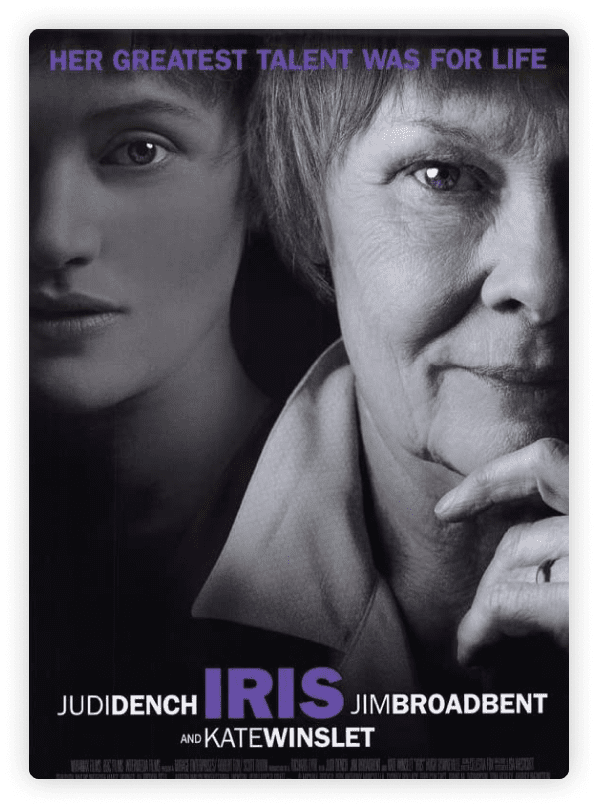
The film starts with Murdoch finding and falling in love with John Bayley, whom she met in Oxford in 1950.
Cleverly, the story is told in time snippets from Bayley’s point of view, taking us on a journey through time. We see the transition from how charismatic, clever, and confident Murdoch was to how Alzheimer’s affected her and shifted her personality.
As Murdoch deteriorates, Bayley is devoted to looking after her and gives his all to ensure she is okay. Of course, this is a very realistic depiction of how it feels to love and live with someone with Alzheimer’s, as you watch your loved one become a shadow of their former self and unable to do tasks that were once second nature.


Iris went on to be nominated for multiple academy awards, indicating that this film isn’t only entertaining from a consumer point of view but does what is needed regarding representation. The fact that so many watched this film and saw an accurate portrayal of dementia is a huge turning point, and it hadn’t been previously executed to this extent at the time of release in 2001.
Overall, Iris is a great film that spreads awareness regarding Alzheimer’s and further helps us to see that no matter how well off you are in life, whether you’re a highly-acclaimed novelist or an academic, this condition can affect you. While this is scary, the story highlights the importance of having loved ones around you, as Iris did with John.
The story is more than just an emotive tale surrounding dementia, and instead truly embodies how finding love can impact your entire life through sickness and health.
The Father
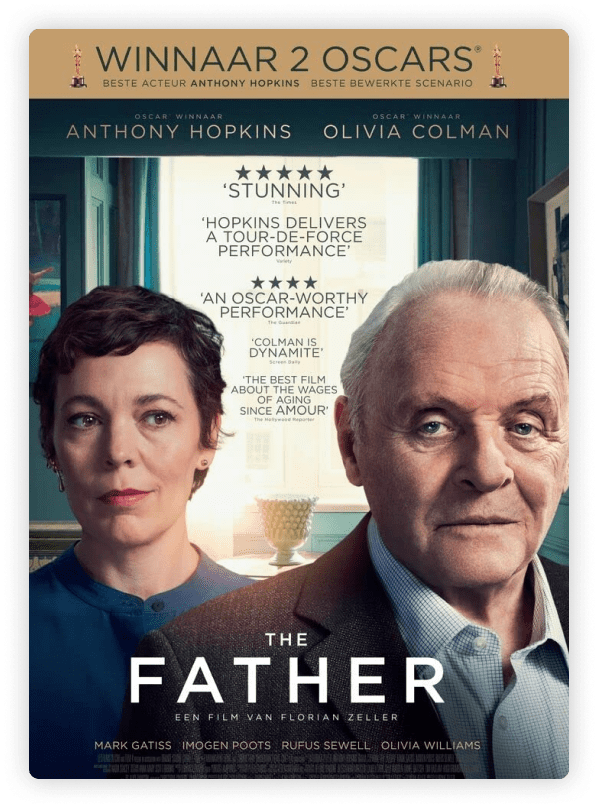
One of the most recent films on our list is The Father. This 2020 creation saw Olivia Colman and Anthony Hopkins act this storyline out with integrity and authenticity, seeing Hopkins rake in BAFTAs and Academy Awards for his performance.
This film follows Hopkins’ character, Anthony, and his battle with dementia, and how he has a consistent inner struggle and confusion that follows him. From not recognizing his daughter to believing he lives in his own flat when he lives with his daughter, there is a constant blur in Anthony’s memory, which is conveyed to the audience psychologically and keeps viewers on their toes throughout the film.
As the film progresses, this confused state becomes more apparent, which is similar to how dementia occurs. Initially, confusion and memory loss are mild, but as time passes, these symptoms become worse and more severe. The Father conveys this well while enabling us to look into how debilitating having dementia must be.
Olivia Colman and Anthony Hopkins act this storyline out with integrity and authenticity, seeing Hopkins rake in BAFTAs and Academy Awards for his performance.
Throughout the film, we see Anthony lose his sense of self and question everything, which again is realistic to dementia. His condition has driven away previous caregivers, which many carers will align with as sometimes you are left with no choice but to step away. In the film, this leaves Colman’s character left to care for her father with the help of carer Laura.
The Father is one of the best films to watch for anyone with the goal of expanding knowledge regarding dementia, whether you know someone recently diagnosed or because you want more of an understanding of the patients you care for. As a viewer, you start to acknowledge the confusing nature of the condition, with the clever screenplay that ensures that the film’s ending isn’t obvious while also aligning with realistic dementia symptoms.
Away From Her
Another poignant emotional story surrounding dementia is Away From Her, starring Julie Christie and Gordon Pinsent. Throughout the film, Fiona and Grant have shared a special bond for the last forty years, with a dedicated and loving marriage bursting with affection.
However, as Fiona is institutionalized by her own desire, she becomes drawn to another man in her care home. This isn’t only confusing for her but causes confusion and sadness for Grant. As the film progresses, we see how these feelings manifest and change the relationship between Fiona and Grant.
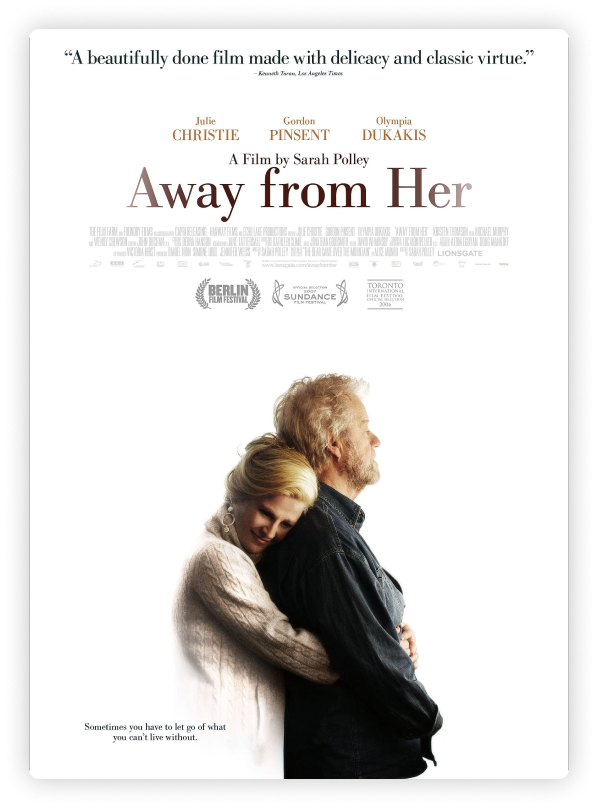
While this film is undoubtedly heartbreaking, it is once again a realistic and accurate depiction of dementia and how the condition affects and trials even the strongest relationships.
Away From Her offers a romantic point of view on dementia and relationships that isn’t over-romanticized like films such as The Notebook are. Of course, romanticized films serve their purpose as being entertaining, but they aren’t quite as realistic as films such as Away From Her.
Still Alice
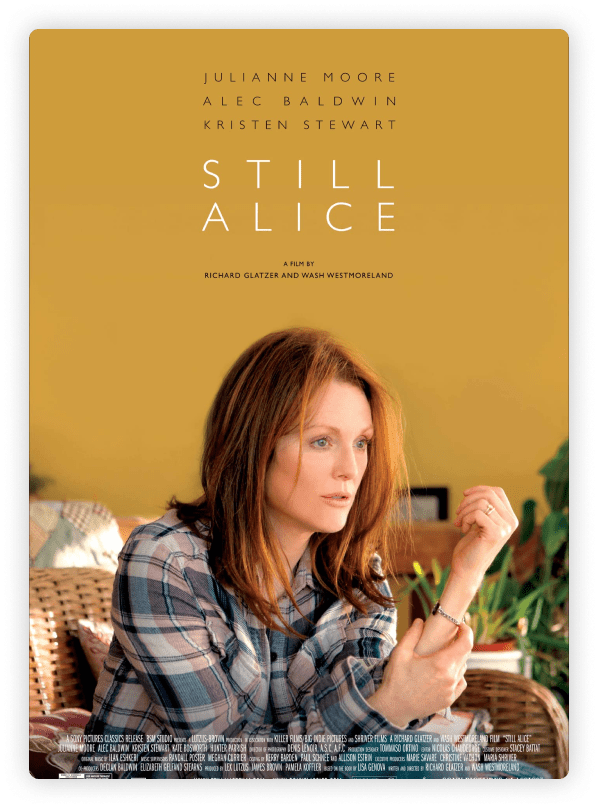
A film that differs from the previous examples on our list is Still Alice, which shows how early-onset dementia can affect families, careers, and relationships. Julianne Moore plays Alice Howland, a happily married woman with three grown children, who begins to lose track of words mid-sentence and feel confused.
As the film progresses, we learn that Alice is diagnosed with Early-Onset Alzheimer’s and must learn how to navigate this condition with her children and husband. The film captures the difficulty of being aware that you are losing memories, as Alice is determined to remember those around her.
The accuracy of Moore’s portrayal of Early-Onset Alzheimer’s is inspiring and leaves viewers feeling emotional and reflective. It is important that these types of dementia portrayals are apparent, as we often only see films focussing on elderly dementia patients when in reality, dementia can happen to people of all ages despite it being less common.
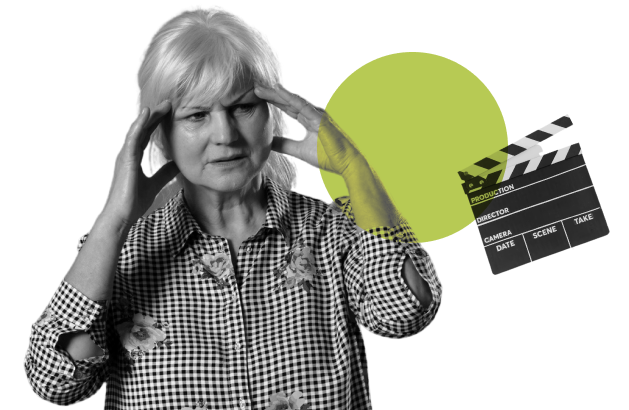
Documentaries to Develop Knowledge Regarding Dementia
Whether someone in your life has recently been diagnosed with dementia or you’re looking into becoming a carer, there are many reasons that you might want to expand your knowledge. While the films we covered above are entertaining and include realistic depictions, the best way to truly develop your understanding is through education, training, and experience.
One way to begin your education regarding dementia is to watch documentaries that include real-life stories and case studies on dementia cases. This will develop your understanding of the condition and ensure you have studied real-life cases.
Let’s take a look at some documentaries that can get you started
The World Turned Upside Down
This documentary was created in 2022,
making it a very recent study with up-to-date information and real-life stories included. The film dives into what it is like living with dementia and caring for someone suffering from the condition, offering a unique and accurate perception.
Throughout the film, viewers watch a play accompanied by audience reflections and an explanation of the creative process, offering insight from multiple sources. The play was created by IDEAL, an Alzheimer’s Society Centre of Excellence. IDEAL’s goal is to improve the lives of those with dementia, and they continue to spread awareness through their creative projects, such as The World Turned Upside Down.
Alive Inside
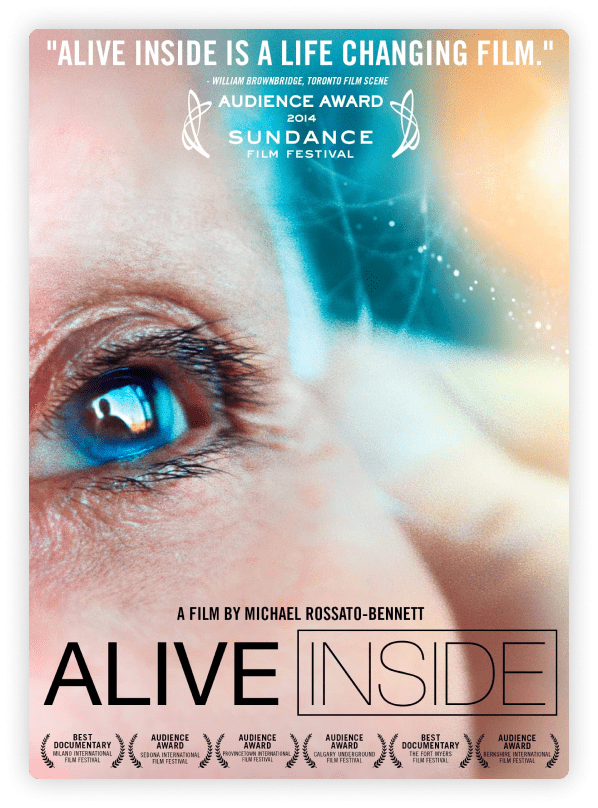
Perhaps one of the most well-known documentaries surrounding dementia, Alive Inside, is both moving and provides viewers with essential knowledge. The film studies the connection between the mind and music, identifying music as one of the most potent tools to invoke emotion and communicate thoughts and feelings.
Music can activate more parts of the brain than any other stimulus and has been found to have the power to alleviate the isolation and frustration that comes with dementia. The film is truly remarkable and touching, seeing different patients unable to communicate finally able to express their feelings after listening to music.
We see that music can bring memories up and invoke emotion in even the most severe cases, significantly comforting patients and family members who grieve their loved ones.

The film aimed to see if music can fill in the gaps that medication currently misses, with healing powers and emotional connections that pills can’t produce.
First Cousin Once Removed
This documentary is based on the life of poet and university lecturer Edwin Honig and his struggles with dementia.
Honig was the first cousin once removed of the documentary’s director Alan Berliner.
Berliner spent five years ensuring that his documentary was accurate, doing justice to Honig and Alzheimer’s, a condition both his grandfather and father suffered from in the last years of their lives.
The film encapsulates how dementia can rob someone of their identity, with scholar Honig struggling to speak and find words in his old age. Despite this, he encounters deep traumatic memories, helping viewers understand that dementia isn’t linear and can often trigger unsettling memories in patients.
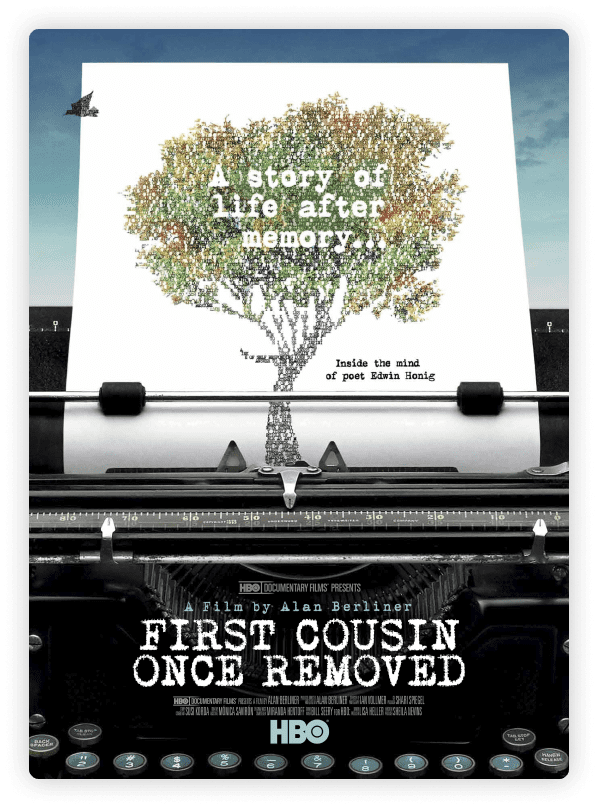
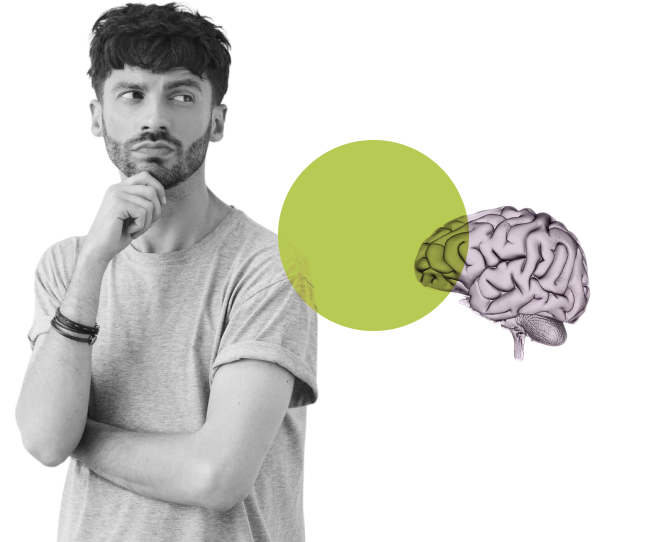
How to Decide on The Type of Content to Show Dementia Patients
If you work in a care home or are a primary care provider for a loved one, you may think of new ideas to keep your patient (s) entertained. While you may not have considered showing them films, movies, and entertainment are a great way to spark interest in those with dementia.

Arts and entertainment are loved by people from all walks of life, with songs, movies, and artwork marking different occasions and times in our lives. This is no different for someone with dementia.
Often, music can be used as therapy for dementia patients due to its ability to spark memories and help with cognitive tasks. But how do films come into play?
Watching movies can trigger positive memories and thoughts while stimulating and keeping the brain active. When the brain is stimulated, there can be significant improvements regarding mood and socializing, which are often huge struggles for dementia patients.
Therefore, when using the above information, we could make a significant change for those struggling with dementia by introducing movies and entertainment to their weekly schedule. Of course, you should gradually introduce routine changes to avoid further confusion.
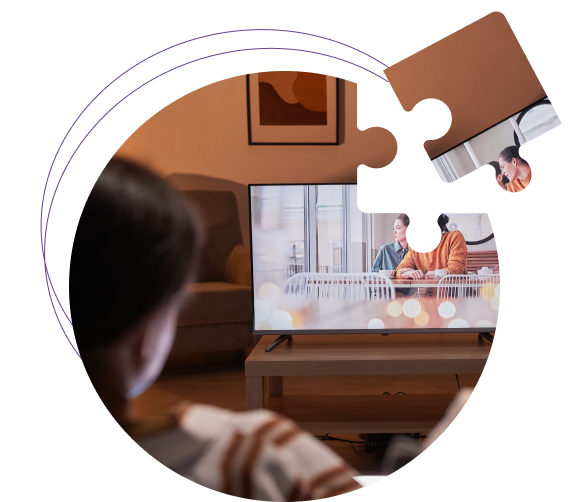

When introducing films to your patients, it is essential to assess the type of genre, content, and style of the movie you will be presenting.
For example, is there a period of your patients’ life that held a traumatic event? In this case, it may be best not to show films with music and stylistic elements of this time to avoid bringing up unwanted memories.
On the other hand, if your patient had a wonderful childhood and was brought up in the 1950s, showing films from this period could spark positive memories and bring great comfort to the viewer.
The top things to consider when picking a film for someone who has dementia is if the film is uplifting, easy to watch, and free from unpleasant language and disturbing content
Movies that are shorter, around 2 hours, can be preferable.
Choosing a movie under two hours in length can be preferable, as concentration levels are likely to dip after prolonged periods.
Let’s take a look at some top film recommendations for dementia patients and why they stand out:
Mamma Mia
While it may initially sound random, you really can’t go wrong with a musical. The great thing about Mamma Mia is that it features music that all generations love, so you could get your patient’s entire family involved in this film. Additionally, Abba’s music was a massive part of everyone’s lives during the 70s and 80s, so there is a chance your patient will feel comforted by these familiar sounds.
Of course, even if your patient doesn’t have a clue who Abba is, there is no denying that their music is incredibly uplifting. Music has wonderful benefits to mood, which makes Mamma Mia an excellent option.

Abba’s music was a massive part of everyone’s lives during the 70s and 80s
Singin' in the Rain
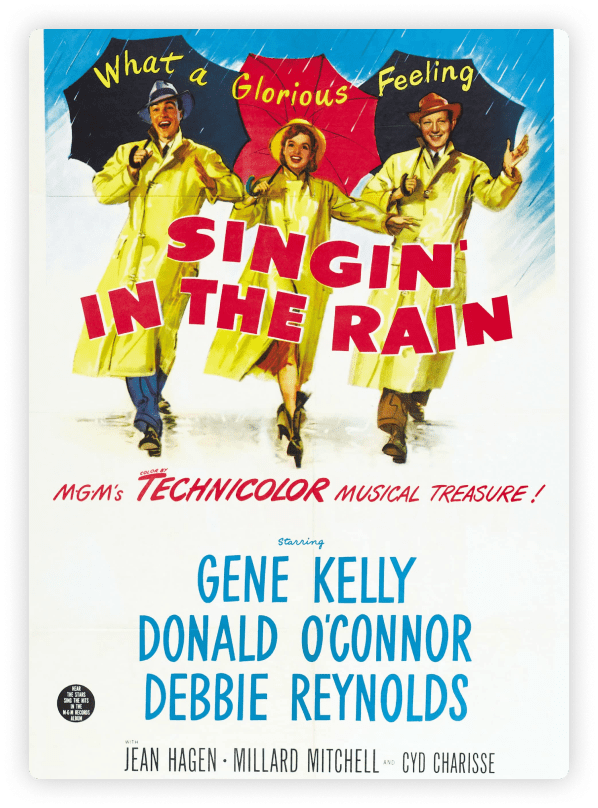
A more classic musical that older generations may be familiar with is Singin’ in the Rain.
This romantic comedy is light and uplifting and features wonderful music that encapsulates the joy of Old Hollywood.
Laurel and Hardy
Another familiar favorite to older generations is slapstick-style comedies such as Laurel and Hardy. While the goal of showing films and TV shows isn’t for your viewer to wholeheartedly know and remember this content, offering a familiar style of entertainment is a great way to invoke a comforting feeling that distracts from the stressful and confusing nature of having dementia.
Additionally, routines performed by Laurel and Hardy are a sure way to make your patient laugh, which is the ultimate goal!

Grumpy Old Men

This film is excellent for dementia patients due to the simple plot that follows a few characters while being entertaining, funny, and easy to follow.
Gaining laughs and spreading joy is the ultimate goal of showing a film to dementia patients, and Grumpy Old Men is bound to do so.

Conclusion

Alzheimer’s and dementia representation in films does more good than bad, from raising awareness on the topic to ensuring that carers have something that they can relate to and even learn from. Of course, films are generally based on fiction and are dramatized or romanticized for a given effect. Still, many of the films we covered today are realistic in their approach, making them both entertaining and accurate.
One thing we found with films that depict dementia is that they often have great casts that can manage to bring a realistic approach to their characters and storylines.
This is excellent, as accurate stereotypes and portrayals of the condition will be spread with this virtuosic acting and directing process.
Going hand in hand with accurate performances is good screenplay and scriptwriting. Some of the films we detailed almost feel like you are reliving an experience with a patient or your loved one suffering from dementia because the writing is so realistic. Again, this helps spread awareness while also being relatable for caregivers.

Although at this moment, documentaries surrounding dementia are sparse, the ones that are out there are incredibly moving and informative.
If viewers have the goal of becoming more knowledgeable on the subject of Alzheimer’s, we recommend watching documentaries that cover the condition before films with the purpose of entertaining, as they are more informative and include real-life stories and dementia cases.
Additionally, we can see a positive correlation between dementia patients and watching films. Both music and entertainment are great for stimulating the brain and can take patients away from the feelings of isolation and stress they face daily. Whether you slowly introduce watching films to your patient’s routine or organize a special occasion with family and friends, movies are an excellent way to improve those with dementia’s mood.


